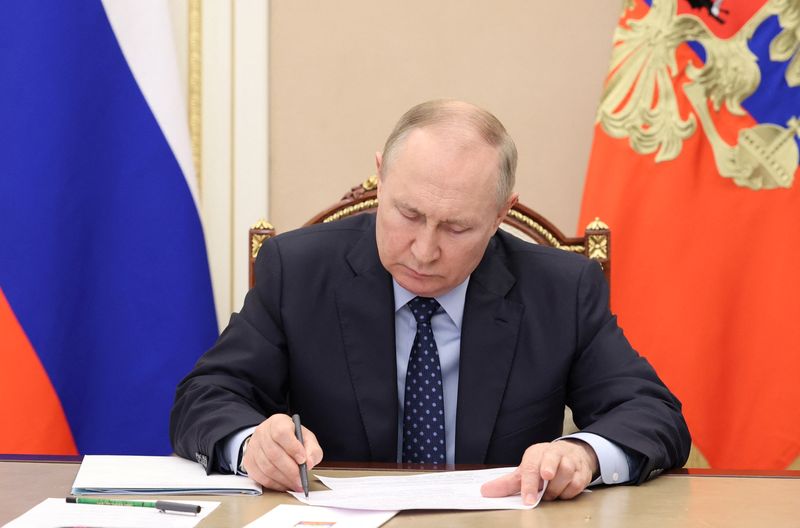MOSCOW (Reuters) - President Vladimir Putin's threat to completely cut off energy supplies to the West in a deepening confrontation over Ukraine could prove to be a double-edged sword for Russia.
Just before the European Union announced a price cap on Russian gas on Wednesday, Putin threatened to sever supplies if such limits were imposed, warning the West it would freeze like the wolf's tail in a famous Russian fairy tale.
Halting flows to Europe from Russia, the world's second largest oil exporter after Saudi Arabia and the top natural gas exporter, would likely further roil global energy markets and leave the world economy facing even higher prices.
Alexei Miller, chief executive of Russian state-controlled gas giant Gazprom (MCX:GAZP), said in August that European gas prices could surge to $4,000 per thousand cubic metres, from around $2,200 seen on Wednesday.
If the EU pursues its plan to wean itself off Russian energy it would hurt Russia too.
A Russian strategy document, seen by Reuters and discussed by the government, outlines the "limitations and risks" to the energy sector of the conflict, including the effective subsidising of domestic energy by international customers.
"A reduction in supplies to foreign consumers will lead to an imbalance in the system, when low prices on the domestic market are offset by export revenue," said the document, which was discussed at a closed meeting chaired by Prime Minister Mikhail Mishustin in Moscow on Aug. 30.
"As a result, there is likely to be a shortage of funds for the necessary development of gasification of the regions," the document, entitled "On the Strategic Directions of Activity in the New Conditions for the Period up to 2030", it added.
If the EU abandons Russian gas by 2027, then budget revenues could fall by 400 billion roubles ($6.55 billion) annually by 2030, the document said. This part of the document was reported by Bloomberg on Sept. 5, although the details of the potential impact on the energy sector have not been previously reported.
If Europe refused Russian gas, it would lead to a potential reduction in gas exports of more than 100 billion cubic metres a year by 2027, almost half of total exports in 2021, according to the document.
As a result, investment in the gas sector over 8 years to 2030 would fall by the equivalent of around $41 billion.
The Kremlin said it had nothing to add to Putin's comments.
PUTIN'S ENERGY CARDS
Selling oil and gas to Europe has been one of the main sources for Russian foreign currency earnings since Soviet geologists found oil and gas in the swamps of Siberia in the decades after World War Two.
And since Boris Yeltsin handed Putin the nuclear codes on the last day of 1999, the former KGB spy has sought to use his energy aces to claw back some of the clout Russia lost when the Soviet Union crumbled in 1991.
Locked into a confrontation with the West over Ukraine, Putin is playing his energy cards again, a lever which Moscow can use against a U.S.-dominated global financial system.
He says that Russia had gained, not lost, from the conflict because it was embarking on a new path.
Putin, who turns 70 in October, has repeatedly said that if Europe does not want to buy Russian oil and gas, or if it tries to cap prices, then Russia will redirect its vast supplies in a major tilt towards Asian powers such as China and India.
But to do so, Russia would need to accelerate the construction of its pipelines eastwards, the document said.
"Power of Siberia 1" is the only major Russian gas pipeline to China. It is expected to deliver 16 billion cubic metres in 2022, 11% of what Russia usually exports to Europe each year.
And "Power of Siberia 2" to China, from the Bovanenkovo and Kharasavey gas fields in Yamal, is yet to be completed.
ENERGY SUPERPOWER?
If Europe can find alternatives to Russian energy, Moscow faces considerable challenges.
"In the most negative scenario, it is expected that by 2027, European countries will be able to completely abandon Russian oil," the document said, with the Druzhba oil pipeline and Baltic ports hit badly.
Druzhba, which means "friendship" in Russian, pumped 36 million tons of oil last year, while Baltic ports handled 60-80 million tons of crude oil annually in 2019-2021.
"The old challenges associated with the rise in the cost of production as a result of the complication of oil extraction and the increase in the share of hard-to-recover reserves will be complemented by the increasing costs of reorienting export flows and increased demand for the tanker fleet," it said.
Isolated from Western technology, the Russian energy sector would face hard choices, especially when it comes to Liquefied Natural Gas (LNG), oil and oil refining.
"The withdrawal of technological partners from LNG production projects will shift the timing of the commissioning of new capacities," the document said.
As Russia rushes to adjust, there could be a reduction in exports of oil products by almost 55% to 2021 levels, or by 80 million tons, which in turn would lead to a drop in refining by 25-30% and difficulties in ensuring sufficient gasoline production for the domestic market, leading to rising fuel prices, the document said.
And while Gazprom has been doing well in recent months, with a record 2.5 trillion roubles in profit in the first six months of 2022, it faces tough longer-term choices.

With about 15% of global and 68% of Russian gas reserves, the world's biggest natural gas company by reserves, may have to freeze wells or flare gas, analysts said.
Gazprom did not reply to a request for comment.